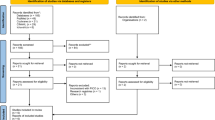Abstract
Anticipatory nausea and vomiting (ANV) after repeated cycles of cytotoxic chemotherapy is thought to be a conditioned response to a conditioning stimulus. Good control of acute and delayed emesis may result in a lower incidence of ANV. We have analysed data from 574 chemotherapy patients who received granisetron as their antiemetic treatment during repeat cycle chemotherapy. Per treatment cycle, less than 10% of patients displayed symptoms of anticipatory nausea and 2% or less had symptoms of anticipatory vomiting. It is concluded that the use of granisetron as an antiemetic during the acute phase of chemotherapy may result in a lower incidence of ANV in patients undergoing repeat cycle chemotherapy.
Similar content being viewed by others
Author information
Authors and Affiliations
Rights and permissions
About this article
Cite this article
Aapro, M., Kirchner, V. & Terrey, J. The incidence of anticipatory nausea and vomiting after repeat cycle chemotherapy: the effect of granisetron. Br J Cancer 69, 957–960 (1994). https://doi.org/10.1038/bjc.1994.185
Issue Date:
DOI: https://doi.org/10.1038/bjc.1994.185
- Springer Nature Limited
This article is cited by
-
Incidence and predictors of anticipatory nausea and vomiting in Asia Pacific clinical practice—a longitudinal analysis
Supportive Care in Cancer (2015)
-
Effects of overshadowing on conditioned and unconditioned nausea in a rotation paradigm with humans
Experimental Brain Research (2014)
-
Anticipatory nausea in animal models: a review of potential novel therapeutic treatments
Experimental Brain Research (2014)
-
Anticipatory nausea and vomiting
Supportive Care in Cancer (2011)
-
Anticipatory nausea and vomiting
Supportive Care in Cancer (2005)




